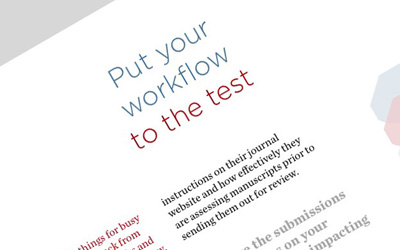
If you ask any legal scholar for one area of article selection that they think all law reviews could improve, there’s a good chance that it will involve communication in some way. For submitting authors, much of the article selection process is a waiting game—waiting to see when law reviews will open, waiting for their submission to be reviewed, waiting on expedite requests, waiting for article decisions—you get the point. All of that waiting can become frustrating for authors if they’re not given clear submission expectations or adequate status updates.
In March 2019, we sent out a survey to all authors who have submitted to law reviews using Scholastica asking them to give feedback on the article selection process. Improving communication with authors was an overarching theme among the 430 responses we received. The top three things law review authors said they wished law reviews would communicate better were:
- Article selection timeframes and submission requirements
- Article decisions (whether it’s a yes, no, or a maybe!)
- Expedite request processes
In this blog post, we share how law reviews can improve communication in each of these areas to better support authors. Let’s get to it!
Article selection timeframes and submission requirements
Communication woes can occur even before an author has submitted their article to a law review. One of the top concerns among submitting authors we surveyed was law reviews failing to clearly communicate their article review timeframes and to open and close submissions accordingly. Many scholars lamented experiences of submitting an article to a law review only to find out later that the e-board was not actively reviewing submissions at that time.
Law reviews using Scholastica can easily communicate when they are reviewing submissions on their “For Authors” page by setting their submission status to “open” or “closed” and adding a brief message about when they will be reviewing new submissions.
Multiple authors who responded to the article selection survey also commented that they wish law reviews would communicate their submission requirements more clearly, including whether the law review:
- Is only accepting submissions in certain topic areas
- Has a hard article length requirement
- Requires manuscript anonymization
- Has particular citation formatting requirements
Additionally, some authors commented that they wish law reviews would announce calls for symposiums and special issues sooner. Legal scholars said that they sometimes find that there is not enough lead time for them to prepare special law review submissions. For law reviews, this could mean missing out on submissions from leading experts in their symposium or special issue topic area.
Law reviews should include detailed submission requirements on their “For Authors” page and add notices about special issues or symposiums to the top of the page as soon as they’re planned so authors see them right away. To amplify calls for special issues or symposiums, law reviews can also share announcements from their social media channels or publication blog (if they have one). Additionally, law reviews can post calls for special issues or symposiums on the Conversation in Scholastica.
Article decisions (whether it’s a yes, no, or a maybe!)
One communication area that virtually all authors surveyed felt law reviews could improve was sending timely article decisions as well as updates when an article decision has been delayed for some reason. For example, if the law review has extended its first round of offers but is still interested in an article in the event that space becomes available for it. After spending time preparing an article, waiting months to hear from one or more law reviews can be highly frustrating for authors.
Law reviews can quickly send authors status updates for delayed decisions in Scholastica using Discussion messages. We also have features to make sending a decision to every author easier including decision letter templates and the ability to send bulk manuscript rejections.
Expedite request updates
Another area of article selection where authors said they think law reviews can improve communication is the expedite request process. Many authors said, similarly to decisions, they get frustrated by radio silence when they submit an expedite request to a law review. Authors don’t want to have to wait for an expedite request deadline to expire to find out that the law review will not be honoring it. Multiple authors surveyed provided direct feedback that they would like to receive responses to expedite requests, even if the answer is no.
More updates all around
Overall, whether it’s knowing when a law review will open or if their article is still under review, legal scholars want law reviews to share submission status updates. Many authors surveyed noted that they recognize how busy editors are and do not expect thorough feedback on their submissions. Rather, authors are looking to law reviews to help them find the submission information that they need and to communicate article status updates and decisions so they don’t feel like they’re waiting in the dark.








